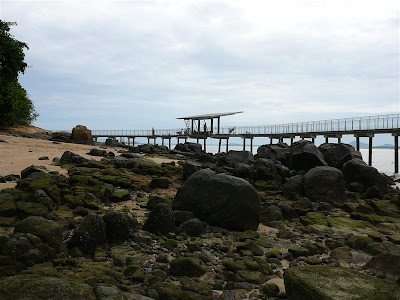
After a brief walkthrough of the coral rubble area to see the survivals of the carpet anemones, we were back to the main sandbar. Sand dollars which usually are found in the northern part can now be found nearer South. If you look closely at the above photo, you can see some circular outlines. And there are a lot of sand dollars dwelling below the sand.

This is what you see when your hand reaches out to pick one and turn it around. A cake sand dollar (Arachnoides placenta)! They are the most commonly seen sand dollars on Chek Jawa. Their body is divided into 5 parts with tiny spines covering the entire body.

Here is our serious-looking Siva and Dr Peter deep in thoughts on the issues of the project.

Something that caught our attention was these black patches of slime covering a huge area of the lagoon nearer to the sand bar area.

A closer look. According to Siti of Teamseagrass, she commented that they are cyanobacteria and they usually come when there are more rain and go quickly too. Bad thing about them is they cover the seagrass.

After my two supervisors left since they have something on, I lingered on to collect some water samples for salinity tests. And we can see from this photo that the boardwalk is completed! Public can now access CJ via the boardwalk from 7th July.

Adding live to CJ will definitely be this pair of dogs.

and also this grey heron that walks around the intertidal flat to hunt for food. We saw one at the beginning of the day with a fish in its mouth. Wow. Looks like the early bird catches the "fish".
After a hard day of work, I left Chek Jawa through the mangrove side since the tide was already coming in fast through sandbar. I don't want to risk walking in murky water since I was alone. What if I step onto Miss Stingray? Mangroves are interesting, esp with these mudskippers.
The boardwalk will also feature the magnificient mangrove ecosystem of Chek Jawa.
Before I say byebye, here's the fiddler crab "waving" me goodbye too.
A bumboat ride shows us the remaining kelongs you can find in Singapore.

The beach is Pasir Ris park. Can you see the city outline at the back?
This trip was a great one, because it updates me how dynamic CJ is, with the movement of sandbar, change in seagrass communities, coming and going of cyanobacteria etc etc. Ecosystems are not static and changes has to take place. It's interesting to learn and study about these changes so that we can monitor and detect what changes are those that require our alert and attention.




Hi, I am a staff from NUS, the Office of Student Affairs. I am also a CJ guide. I wonder if it is possible to lead me on a tour of the boardwalk on Monday, 23 July as I missed training on 23 June. My email address is osachowj@nus.edu.sg. It might be high tide on Monday but I really need to know about the mangrove.
ReplyDeleteHi Jacqueline, I've sent you an email. :)
ReplyDelete